 Online video sites may be a great way to watch how-to videos on repairing things around your home or finding a new recipe to try, but are they the best place to find out about cosmetic procedures?
Online video sites may be a great way to watch how-to videos on repairing things around your home or finding a new recipe to try, but are they the best place to find out about cosmetic procedures?
Researchers at Rutgers University have found that millions of people seek out advice about cosmetic procedures from the video-sharing website YouTube. But they also discovered that many of these videos are shared by medical professionals who are not qualified to advise on cosmetic procedures.
They also found that many of the “advice-sharing” videos are marketing campaigns and not educational pieces.
As a result, millions of people who use YouTube as a resource for facial cosmetic surgery procedures end up missing critical information about risks, alternative options and more.
During the study, the Rutgers team reviewed the top 240 videos with keyword searches that included terms such as “facial fillers,” “dermal fillers,” “face-lift,” “lip augmentation” and “eyelid surgery.”
The 240 videos used in the research had a combined 160 million views.
The study authors then reviewed who was posting the videos and categorized the posters as medical professionals, patients or other third-party posters.
They found that the majority of the videos they evaluated did not have a medical professional qualified in the procedures that were performed or portrayed.
Ninety-four videos did not feature a medical professional at all.
The Rutgers researchers also found that videos that were posted by board-certified surgeons were more geared to marketing procedures and not educating viewers.
As a result of their findings, the study authors cautioned users to be aware that the videos they find on YouTube may be biased, and the best way to research procedures and physicians is to seek out qualified providers and investigate their credentials. They caution that YouTube is a marketing platform and that should be top of mind for viewers.
Dr. Christy Walker, a dual-board-certified cosmetic surgeon and gynecologist in Plano, Texas, agrees.
“When seeking out cosmetic procedures – whether it is a surgical procedure such as a face-lift or liposuction, or an aesthetic service such as dermal fillers or Botox injections – patients should be diligent about using a board-certified physician trained in that specific procedure,” said Walker.
Why? Board-certified providers have the training, education and experience necessary to perform the procedure.
“You are trusting your face or body to a physician; you want to make sure they are qualified to perform the service you are seeking not only because you want great results, but you also want to protect your health,” Walker said.
Another benefit of using a board-certified provider is that they know how to handle any post-operative complications.
“Although the risk of complications decreases when using a board-certified cosmetic surgeon, some patients do experience complications after their procedures. A qualified and board-certified provider knows how to mitigate complications and keep patients healthy,” Walker said.
The study is not Rutgers’ first foray into researching cosmetic procedures; another 2018 investigation by the university revealed that selfies can distort appearance.
One example of this distortion is that selfies can make the tip of the nose appear 7 percent wider when taken at a distance of 12 inches away from the face. A selfie at the same distance can make the base of the nose appear 30 percent wider than a picture taken from 5 feet away.
This selfie distortion may cause body dysmorphic disorder, a condition that causes individuals to obsessively fixate on a perceived flaw in their appearance.
Sources:
Economic Times. Do you turn to YouTube for advice on cosmetic surgery procedures? Beware, they are misleading. 18 August 2018.
Live Science. Selfies Distort Your Face by 30% — And Here’s the Math to Back It Up. 1 March 2018
